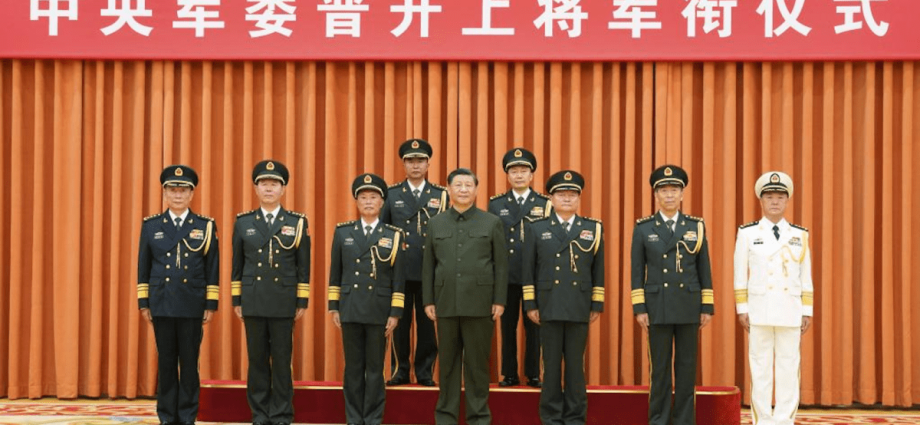Beijing has overhauled the leadership of the People’s Liberation Army’s rocket force after several senior officers were reportedly held in an anti-corruption investigation.
Wang Houbin, previously deputy commander of the navy, and Xu Xisheng, an officer in the air force’s Southern Theater Command, were given the rank of general in a ceremony on Monday. The event, hosted by Central Military Commission (CMC) Chairman Xi Jinping, was aimed at celebrating the PLA Day on Tuesday.
State media said Wang and Xu attended public events with the titles of the rocket force’s commander and political commissar, respectively, for the first time. Caixin said the new appointment means that the force’s original commander, Li Yuchao, and political commissar, Xu Zhongbo, have already stepped down.
The South China Morning Post reported on July 28 that Li is now being probed by the CMC’s anti-graft body, the Commission for Discipline Inspection.
In fact, the investigation of Li was first tweeted by Yao Cheng, a former PLA navy officer who fled to the US in 2016, on June 26. Citing his source, Yao said Li’s son, who lives in America, sold some PLA documents to the US.

“The CCP usually handles officials’ political problems in the name of economic offenses, instead of openly saying who had leaked confidential documents or disobeyed its orders,” Yao Cheng says in a video released on Sunday.
“The rocket force, the navy and the air force have huge budgets. It’s inevitable that some money ended up being spent on officers’ personal and entertainment expenses,” he says. “If the party has to investigate the rocket force, many officers will be affected.”
He said in a previous interview that Beijing is upset that some officers in the rocket force did not want to join battles in the Taiwan Strait. He said these officers knew their bases would be bombarded by the US military.
Military bases exposed
On October 24, the China Aerospace Studies Institute (CASI), a unit of the Air University in the United States, in a 255-page report exposed the locations and functions of all the nine bases and other supporting units of the Chinese rocket force, which was formerly known as the PLA 2nd Artillery Force (PLASAF) until 2016.
Clarence Wu, a Taiwan-based military columnist, writes in an article published on November 1 that normally Washington should not have released its intelligence to the public as the Chinese army will then change its plans and investigate those who leaked the information. Wu says the US wants to gain strategic and political benefits by publishing the information.
The release of the CASI report was followed by a face-to-face meeting between Xi and US President Joe Biden on the sideline of the G20 Summit in Bali on November 14. They discussed the Taiwan issue, the Ukrainian-Russian war and trade and technology matters.
US-based Chinese political commentator Chen Pokong said in early July that officers in China’s rocket force were fearful at the prospect of a war between China and the US in the Taiwan Strait.
He said many of these officers have private connections with the US and pretend to be toeing Beijing’s tough diplomatic line. He said Xi was alerted by the fact that the US knew so much about China’s rocket bases.
On March 30 this year, the PLA’s All-Army Weapons and Equipment Procurement Information Network (WEAIN) said it had set up an email address for people to report illegal and irregular procurement cases.
Ming Pao, a Hong Kong newspaper, reported on May 24 that the rocket force’s ex-deputy, Zhang Zhenzhong and present deputy, Liu Guangbin, had been probed since April.
The newspaper also reported on July 13 that Ju Qiansheng, commander of the PLA Strategic Support Force, is under investigation.
On July 26, the WEAIN in a statement called on whistleblowers to report illegal and irregular procurement cases that happened after October 2017. It said officials who gained personal benefits by helping bidders win tenders should be punished.
Mysterious deaths
The investigation coincided with two mysterious death cases last month and the removal of Chinese Foreign Minister Qin Gang on July 25.
Wu Guohua, a former deputy chief of the rocket force, died at home in Beijing on July 4, according to a report published by ThePaper.cn on July 27. His relatives said Wu died of sudden cerebral hemorrhage. But Zhang Xiaoyang, former dean of the PLA University of Foreign Language, said the retired general hanged himself due to high work pressure and an unhappy family life.
On July 1, Feng Yanghe, a PLA colonel and a specialist in intelligent planning, artificial intelligence and military simulations, died in a traffic accident. The 38-year-old man worked long hours on a confidential project. After he left work at 2 am on the fateful day, his car crashed into a truck.
Meanwhile, the PLA Daily reported on Monday that a unit of the rocket force had recently held a drill on a hot summer day. It said its trucks carrying rockets drove more than a hundred kilometers to the deep forest and tested whether their equipment could work in high temperatures.
Read: China-US trade war slows down a bit – baby steps?
Follow Jeff Pao on Twitter at @jeffpao3

